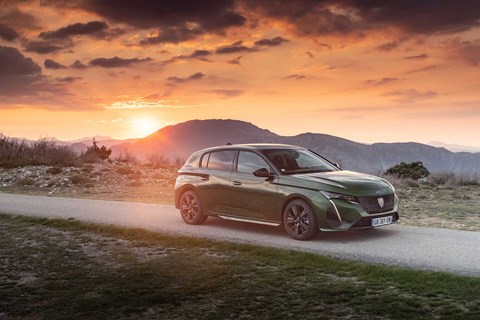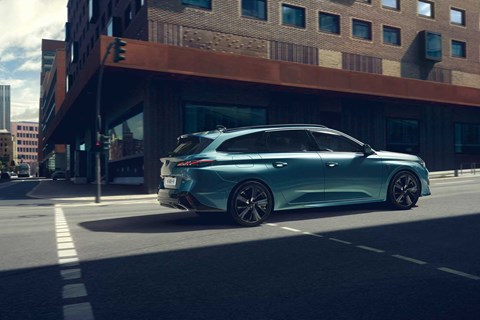► First details of pure electric 308
► 250 miles of range, on sale 2023
► Offered as hatchback and estate
Peugeot has revealed first spec details of its electric e-308, to hit the market in 2023 and endow the hatchback and wagon with a full house of powertrains: petrol, diesel, plug-in hybrid and EV.
The battery electric system is not a straight lift from the established e-208 and e-2008. The e-308’s battery capacity is 54kWh, and the single electric motor delivers a little more punch. Peak power is 115kw (156hp), with 270Nm of torque.
Peugeot e-308 electric range and the tech enabling it
The e-308 is touted as having a range in excess of 250 miles (400km), due to a painstaking programme of efficiency measures.
They include a new NMC battery cell chemistry (with more Nickel and less Magnesium and Cobalt), plus a heat pump to warm the cabin with less drain on the battery. The 308 has a reasonably aerodynamic profile (0.28 coefficient of drag) thanks to an extended flat underbody and rear spoiler.
And crucially vehicle weight is around 1600kg – that’s competitive with Renault’s new electric Megane, and lighter than VW’s ID.3. Peugeot calculates it will consume 12.5kWh per 100km – that translates to about 5 miles per kWh. If it can deliver that on road, it will be ferociously competitive.
Differences with the hybrid go deeper than the skin
The car pictured here is the 308 plug-in hybrid, though it’ll take keen eyes to spot any changes with the BEV: the most notable one is an ‘e’ badge on the front wings, replacing the lion badge present on some 308 trims.

‘Both cars look exactly the same outside and inside,’ says Peugeot’s electric platform engineer Remi Seimpere. ‘The difference is under the floor with a big battery, and the [front] electric motor.’
Batteries are predominantly stowed in two slabs beneath the front and rear seats, with the charging port at the rear. While combustion 308s all have a torsion beam suspension, packaging the full electric powertrain requires a revised rear axle design. Cargo space is the same as the hybrid’s – 361 litres for the hatch, 548 for the SW – though both are down on the combustion models’.
Although Peugeot offers all-wheel drive on the plug-in hybrid 508 and 3008, the e-308 will be strictly front-drive only.
How quickly will the e-308 charge
The 400v battery system can charge at up to 100kW DC, which will bestow around 11km a minute and replenish from 10-80 per cent in a claimed 30 minutes. Households with three-phase electricity and a wallbox should be able to fully charge in five hours; single phase 7kW charging will also be possible.

Can you get the e-308 as an SW estate?
The good news is Peugeot will also offer the SW estate with electric power: it’ll provide a welcome alternative to the MG 5, one of few zero emissions wagons on the market.

Peugeot is proud that the 308 range – on the shortlist of seven for Europe’s Car of the Year – will be notable on the market for offering petrol, diesel, plug-in hybrid and EV (though VW’s Golf Mk7 also achieved the full deck).
And Peugeot CEO Linda Jackson thinks such a broad range offers something for every customer.
‘As consumers, we’re all on a journey from being all internal combustion engine to eventually all fully electrified. And Peugeot has a real benefit in its multi-energy platform [strategy]. The 308 is the first [contemporary] vehicle able to offer ICE, plug-in hybrid and electric. And I think that’s the right way to assist our customers, and help them move along on this journey.’
Will an electric Vauxhall Astra and DS 4 follow?
The Stellantis group – owner of Peugeot, Vauxhall, Fiat and DS Automobiles among its many brands – has made no secret of its plans to fully electrify the EMP2 platform underpinning the 308. It’s an architecture also shared with Vauxhall’s new Astra and the DS 4.
Vauxhall has confirmed an Astra-e is on the way, and the DS 4 is sure to follow suit. But it looks like Peugeot will be the first to market, likely in autumn 2023 for UK cars.